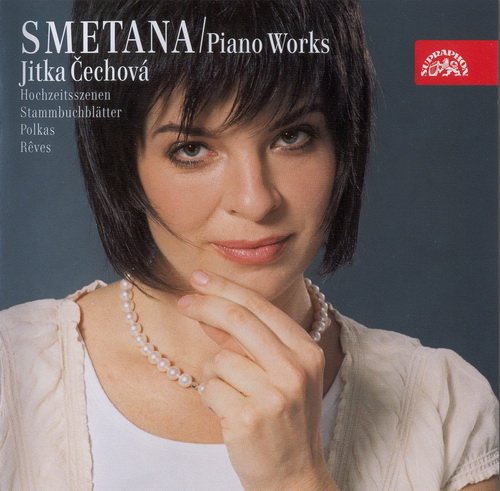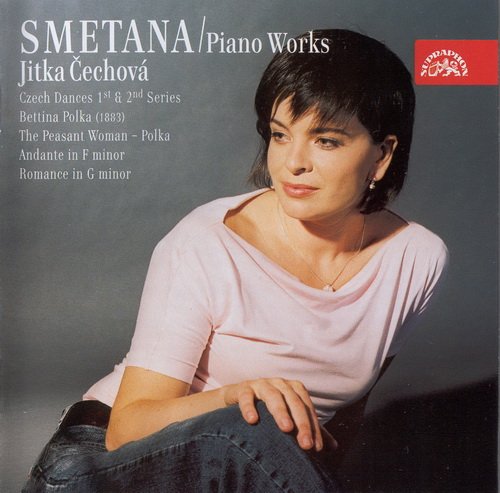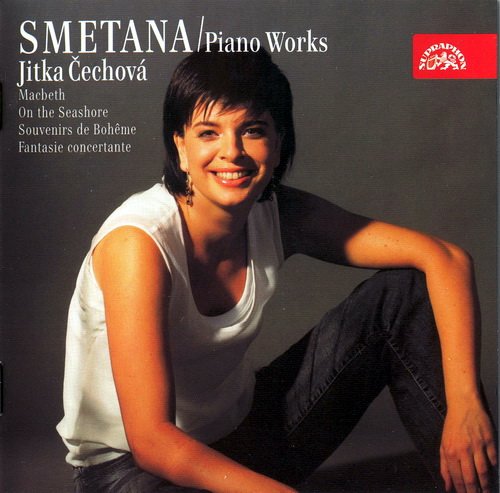
Jitka Cechova - Bedrich Smetana: Piano works vol. 1,2,3 (2005-2007)
BAND/ARTIST: Jitka Cechova
- Title: Bedrich Smetana: Piano works vol. 1,2,3
- Year Of Release: 2005-2007
- Label: Supraphon
- Genre: Classical / Piano
- Quality: APE (image+.cue,log,scans)
- Total Time: 57'58 + 69'35 + 57'58
- Total Size: 609 MB
- WebSite: Album Preview
Tracklist:
vol. 1
1 Macbeth and the Witches (1859) [9:13]
2 DerNeugierige / Inquisitive (1858) [4:16]
3 Ball-Vision. Polka-Rhapsody (1858) [4:06]
4 Bettina Polka (1859) [3:25]
5 Concert Etude in C major (1858) [5:28]
Souvenirs de Boheme en forme de polkas, 0pp. 12-13 (1859-60)
6 Polka in A minor, Op. 12, No. 1 [2:39]
7 Polka in E minor, Op. 12, No. 2 [6:02]
8 Polka in E minor, Op. 13, No. 1 [2:09]
9 Polka in E fiat major, Op. 13, No. 2 [5:40]
10 On the Seashore / Am Seegestade [5:11]
Concert Etude in G sharp minor, Op. 17
11 Fantasie concertante on Czech Folk Songs (1862) [8:56]

vol. 2
Reves (1875) [28:40]
1 Le bonheur eteint [4:22]
2 La consolation [4:30]
3 En Boheme. Scene champetre [4:55]
4 Au salon [4:00]
5 Pres du chateau [5:33]
6 La fete des paysans bohemiens [5:01]
Stammbuchblatter [10:41] (c 1848-53, posthumous compositions)
7 in B flat major [1:29] - 8 in B minor [0:57]
9 Toccatina in B flat major [1:46]
10 in G major [0:52] - 11 in G minor [0:50]
12 in E flat minor [3:16] - 13 in B flat minor [1:11]
14 Andante in E flat major (c 1853) [2:16]
Polkas (c 1852-55) [15:50]
15 Polka in E major [2:50] - 16 Polka in G minor [5:16]
17 PolkainAmajor [5:19] - 18 Polka in in F minor [2:16]
Hochzeitsszenen - 'Wedding scenes' (1819) [11:42]
19 I. Wedding procession [3:13]
20 II. Bridegroom and Bride [2:57]
21 III. Wedding Festivity - Dance [5:27]

vol. 3
Czech Dances first Series (1877) [12:26]
1 Polka 1 in F sharp minor [2:53]
2 Polka II in A minor [2:36]
3 Polka III in F major [3:29]
4 Polka IV in B flat major [3:14]
Czech Dances second Series (1879) [44:14]
5 Furiant [5:37]
6 Slepicka / The Hen [3:14]
7 Oves / The Oats [5:31]
8 Medved / The Bear [3:39]
9 Cibulicka / Little Onion [5:02]
10 Dupak / Stamping Dance [4:00]
11 Hulan / The Lancer [4:49]
12 Obkrocak / The Astride Dance [3:14]
13 Sousedska / The Neighbour's Dance [4:49]
14 Skocna / The Jump Dance [3:37]
15 Bettina Polka (1883) [1:47]
16 The Peasant Woman - polka (1879) [3:47]
17 Andante in F minor (1880) [0:55]
18 Romance in G minor (1881) [1:56]
vol. 1
1 Macbeth and the Witches (1859) [9:13]
2 DerNeugierige / Inquisitive (1858) [4:16]
3 Ball-Vision. Polka-Rhapsody (1858) [4:06]
4 Bettina Polka (1859) [3:25]
5 Concert Etude in C major (1858) [5:28]
Souvenirs de Boheme en forme de polkas, 0pp. 12-13 (1859-60)
6 Polka in A minor, Op. 12, No. 1 [2:39]
7 Polka in E minor, Op. 12, No. 2 [6:02]
8 Polka in E minor, Op. 13, No. 1 [2:09]
9 Polka in E fiat major, Op. 13, No. 2 [5:40]
10 On the Seashore / Am Seegestade [5:11]
Concert Etude in G sharp minor, Op. 17
11 Fantasie concertante on Czech Folk Songs (1862) [8:56]

vol. 2
Reves (1875) [28:40]
1 Le bonheur eteint [4:22]
2 La consolation [4:30]
3 En Boheme. Scene champetre [4:55]
4 Au salon [4:00]
5 Pres du chateau [5:33]
6 La fete des paysans bohemiens [5:01]
Stammbuchblatter [10:41] (c 1848-53, posthumous compositions)
7 in B flat major [1:29] - 8 in B minor [0:57]
9 Toccatina in B flat major [1:46]
10 in G major [0:52] - 11 in G minor [0:50]
12 in E flat minor [3:16] - 13 in B flat minor [1:11]
14 Andante in E flat major (c 1853) [2:16]
Polkas (c 1852-55) [15:50]
15 Polka in E major [2:50] - 16 Polka in G minor [5:16]
17 PolkainAmajor [5:19] - 18 Polka in in F minor [2:16]
Hochzeitsszenen - 'Wedding scenes' (1819) [11:42]
19 I. Wedding procession [3:13]
20 II. Bridegroom and Bride [2:57]
21 III. Wedding Festivity - Dance [5:27]

vol. 3
Czech Dances first Series (1877) [12:26]
1 Polka 1 in F sharp minor [2:53]
2 Polka II in A minor [2:36]
3 Polka III in F major [3:29]
4 Polka IV in B flat major [3:14]
Czech Dances second Series (1879) [44:14]
5 Furiant [5:37]
6 Slepicka / The Hen [3:14]
7 Oves / The Oats [5:31]
8 Medved / The Bear [3:39]
9 Cibulicka / Little Onion [5:02]
10 Dupak / Stamping Dance [4:00]
11 Hulan / The Lancer [4:49]
12 Obkrocak / The Astride Dance [3:14]
13 Sousedska / The Neighbour's Dance [4:49]
14 Skocna / The Jump Dance [3:37]
15 Bettina Polka (1883) [1:47]
16 The Peasant Woman - polka (1879) [3:47]
17 Andante in F minor (1880) [0:55]
18 Romance in G minor (1881) [1:56]
Smetana’s piano works, as well as his operas, are looked upon as a foundation of national Bohemian music, but—to an outsider—the links to international masters remain all too clear. Most of the piano music was written early in his composing life; while it shows the hallmarks of an able pianist and a burgeoning, well-grounded composer, it lacks sparkle and originality. The brief Stammbuchblätter (“Album Leaves”) strikes one as a shopping spree, trying on the styles of Chopin and Schumann; a haunting E?-Minor piece even resembles a Bach fantasia. The four Polkas (1852–53) mix folk-dance character with the music of Smetana’s sophisticated European colleagues. Late in life, forced by blindness to retire from an active career in the opera house, Smetana returned to composing full time, producing his final works, Má Vlast, and, in 1875, Rêves. It is an effective cycle of six character pieces, the title of each offering the merest suggestion of its dream; but Chopin and Schumann still permeate the music, along with an occasional hint of Brahms in the contrapuntal “By the Castle” movement. Thus far, the music is most winning, but the overtly Lisztian finale, “Harvest Festival,” is an unconvincing imitation of Smetana’s Hungarian contemporary. Two cycles of Czech dances, nearly an hour’s worth of music, followed a few years later; they are true monuments of Czech keyboard-writing. Radoslav Kvapil’s sensitive performances are no longer available, but Antonin Kubalek’s are; recorded by the now defunct Dorian label in the Troy Savings Bank Music Hall, they are now on Brilliant Classics 92451, a two-CD set that goes for under 10 dollars.
Jitka ?echová has been collecting competition prizes for two decades, but is still young; the earliest ones must have been as a mere child. In addition to giving solo recitals and playing with orchestras, she is also the pianist of the highly regarded Smetana Trio. The opening notes of Rêves, which begins the disc, suggest the surety of a master: an easy grace, warm, solid tone, and a natural feel for this music. She is hindered, however, by her unidentified piano, which is even and solid across most registers but exhibits some dry notes at the high end, even before the top octave is reached. The instrument warms her playing through the first five dreams but sabotages the Lisztian extensions of its finale. Claudius Tanski plays the work equally well on an MDG disc, and his Steinway D retains its tone a few notes higher, allowing the finale to make a better impression. ?echová proves a winning interpreter of the early works, too, lacking only the ingratiating personal character developed over the decades by such veteran masters as Kvapil and Kubalek. In the Lisztian thunder that climaxes the “Wedding Dance,” ?echová realizes the full excitement without bombast or smudging, keeping all the notes audible.
Jitka ?echová has been collecting competition prizes for two decades, but is still young; the earliest ones must have been as a mere child. In addition to giving solo recitals and playing with orchestras, she is also the pianist of the highly regarded Smetana Trio. The opening notes of Rêves, which begins the disc, suggest the surety of a master: an easy grace, warm, solid tone, and a natural feel for this music. She is hindered, however, by her unidentified piano, which is even and solid across most registers but exhibits some dry notes at the high end, even before the top octave is reached. The instrument warms her playing through the first five dreams but sabotages the Lisztian extensions of its finale. Claudius Tanski plays the work equally well on an MDG disc, and his Steinway D retains its tone a few notes higher, allowing the finale to make a better impression. ?echová proves a winning interpreter of the early works, too, lacking only the ingratiating personal character developed over the decades by such veteran masters as Kvapil and Kubalek. In the Lisztian thunder that climaxes the “Wedding Dance,” ?echová realizes the full excitement without bombast or smudging, keeping all the notes audible.
As a ISRA.CLOUD's PREMIUM member you will have the following benefits:
- Unlimited high speed downloads
- Download directly without waiting time
- Unlimited parallel downloads
- Support for download accelerators
- No advertising
- Resume broken downloads


